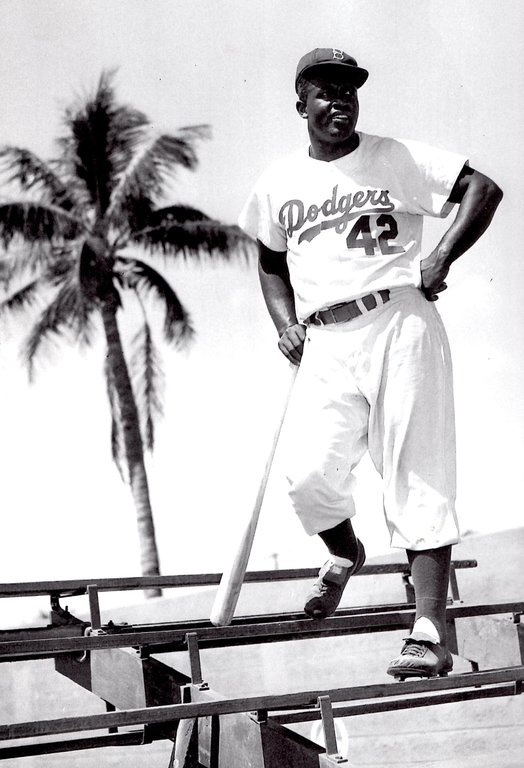Click on “Home” icon on left to see display of all articles. Follow me on Twitter: @Livac2
The Great Jackie Robinson
Today is the anniversary of Jackie Robinson’s birthday – he was born 100 years ago – so I thought it would appropriate to post excerpts from one of my earlier Jackie Robins articles…
“With February being Black History Month, I thought it would be a good time to kick off the month with a few words about the great number 42 – Jackie Robinson – who famously broke the major league color line in 1947. Here’s a few words about Jackie’s life and career:
Jackie Robinson was born in Cairo Georgia on January 31, 1919, the youngest of five children. Robinson broke the baseball color line when the Brooklyn Dodgers started him at first base on April 15, 1947. As the first major league team to play a black ball player, the Dodgers ended the racial segregation that had relegated blacks to the Negro leagues for six decades. The example of Robinson’s character, his use of nonviolence, and his unquestionable talent challenged the traditional basis of segregation, which then marked many other aspects of American life.
In addition to his cultural impact, Robinson had an exceptional baseball career. Over 10 seasons with the Dodgers, he hit .311 with 1518 hits, 137 home runs, and 734 RBIs. Robinson played in six World Series and contributed to the Dodgers’ 1955 World Series championship. He was selected for six consecutive All-Star Games, from 1949 to 1954. He received the first Rookie of the Year Award in 1947, and won the National League MVP Award in 1949. Robinson was inducted into the Baseball Hall of Fame in 1962. In 1997, Major League Baseball universally retired his uniform number 42, across all major league teams. Initiated for the first time on April 15, 2004, Major league Baseball has adopted a new annual tradition, “Jackie Robinson Day”, on which every player on every team wears #42.
In the mid-1940s, Branch Rickey, general manager of the Brooklyn Dodgers, began scouting the Negro leagues for a possible addition to the Dodgers’ roster. Robinson had only played 47 games at shortstop for the Kansas City Monarchs, hitting .387 with five home runs, and registering 13 stolen bases. Rickey selected Robinson from a list of promising black players and interviewed him for assignment to the Montreal Royals. Rickey was especially interested in making sure his eventual signee could withstand the inevitable racial abuse that would be directed at him. In a famous three-hour exchange on August 28, 1945, Rickey asked Robinson if he could face the racial animus without taking the bait and reacting angrily. Robinson was aghast: “Are you looking for a Negro who is afraid to fight back?” Rickey replied that he needed a Negro player “with guts enough not to fight back.”
Larry Doby, who broke the color line in the American League the same year as Robinson, said, “One of the things that was disappointing and disheartening to a lot of the black players at the time was that Jack was a great player, but not the best player. The best was Josh Gibson. I think that’s one of the reasons why Josh died so early – he was heartbroken.”
Robinson was also known for his pursuits outside the baseball diamond. He was the first black television analyst, and the first black vice president of a major American corporation. In the 1960s, he helped establish the Freedom National Bank, an African-American-owned financial institution based in Harlem, New York. In recognition of his achievements on and off the field, Robinson was posthumously awarded the Presidential Medal of Freedom and the Congressional Gold Medal. Jackie Robinson died on October 24, 1972.

-Gary Livacari
Photo Credits: All photos from the Brooklyn Dodgers Photographs of Barney Stein.
Information: Excerpts edited from the Jackie Robinson Wikipedia page.
Thanks for reading my post. Hope you enjoyed it! Before you leave, I hope you’ll consider:
-Viewing the other posts in my blog. Click “Home” icon on left to see display of other posts.
-Following me on any one of my social networks.
-Sharing to your favorite social media
-Leaving a comment…I love interacting with my readers!
-Subscribing for automatic updates
